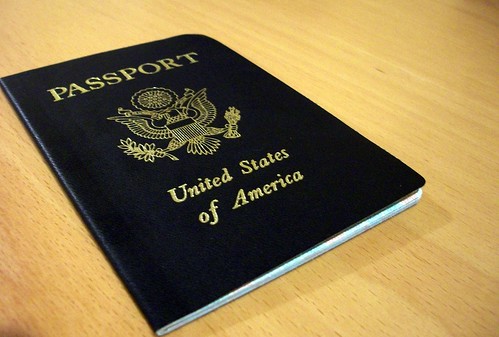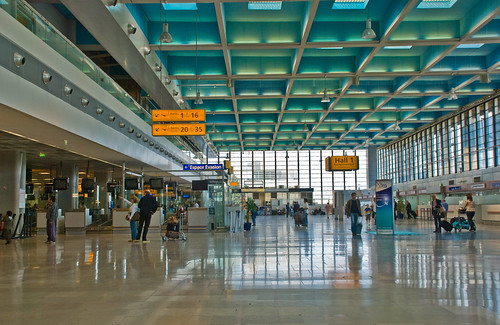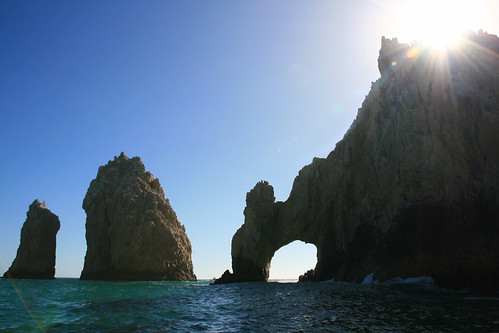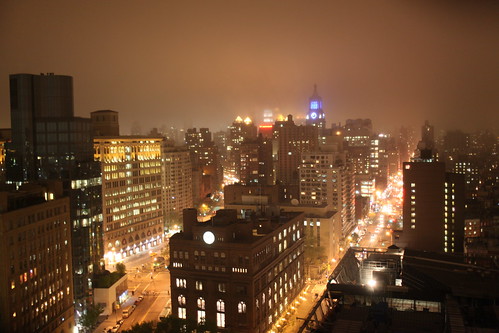One thing about the French: they love their bureaucracy. Cinema passes, library cards and bus passes each require a passport-sized photo to verify, each time you use them, that you are actually the individual to whom each card was issued. Opening a checking account requires documentation proving that you live at the address you claim is your residence and, if you aren't the primary occupant of record, a letter from that person is necessary, along with documentation that
they are, in fact, the primary occupant of record.
When I went to the French embassy in Washington during the summer of 2005 to obtain my student visa (for which one must apply in person), I was carrying approximately a pound of paperwork. In addition to my passport - in good condition, with at least two blank pages at the back - the requested photocopies of the appropriate pages and various other forms of official identification, I also had documentation of my enrollment at GW, documentation of my acceptance into my study abroad program, documentation from my parents that they had sufficient funds ($600/month was the minimum amount, I believe) to support me for the duration of my stay in France, proof of my flight itinerary, documentation from my study abroad program that I would have a legitimate place to live during my time in France, two passport-sized photos and a credit card for the visa application fee, although I no longer remember what it was - less than $150, possibly less than $100.
I walked out ninety minutes or so later, the proud bearer of a pretty French short-stay visa that took up a full page in my passport. I was a little confused as to why I had been issued a short-stay visa, since I was going to be in the country for approximately eight months, which did not, in fact, qualify as "short," but I was confident that someone would explain it to me before it expired on October 30th.
 |
Official logo of the French Republic,
via Wikimedia Commons |
Among the handful of students in my program planning to stay in France for a full year of study, rumors circulated about what was involved in securing a
titre de séjour (long-stay visa). We determined that some type of medical visit was involved, and were assured that we would receive official notification of what was required and when. Sure enough, in late October, I received a letter notifying me of a medical visit in Marseille in November. I was assured that my fears of being deported because my short-stay visa actually expired at the end of October were groundless.
I made my way to the appointed office at the appropriate time on the designated day and moved from one waiting area to the next with several of my fellow students and a lot of people who looked like they were probably trying to renew their permanent resident status. My eyes were checked, my weight noted. (I can confirm that French women really don't get fat: after two months of feeling like I was consuming more food than I'd ever eaten in my life, it turned out I'd lost ten pounds.)
I was escorted to another waiting area, then called into one of three small cubicles built into one wall of the room. A woman explained that I was to remove all clothing and any jewelry from the waist up and wait to be called again for my spine x-ray, then left me to my own devices in the cubicle. I took a deep breath and expelled it - what was becoming my standard method for dealing with situations my self-conscious American brain found dauntingly immodest - then hung my clothes on the hooks provided and stashed my jewelry in my pockets. My name was called from the side of the cubicle opposite the one I'd entered - by a man's voice. I rolled my eyes at myself, took another deep breath and let it out as I stepped into the x-ray room. The doctor, or x-ray technician, or whatever he was, was relatively young and reached out to shake my hand with a smile. I bit the tip of my tongue to keep the slightly hysterical laughter in my head at bay and managed a polite greeting. Five minutes later, I was safely back in my sweater and headed back to the bus station.
Once my x-ray had been declared to show I was healthy (I assume they were looking for evidence of tuberculosis in my lungs), I was instructed to proceed to a government office, conveniently in Aix-en-Provence this time, to secure my visa. The man at the little office window on the street took my paperwork and passport, handed the passport back half a minute later, indicated I was to sign the long-stay visa, stamped and initialed it and waved me on my way with hardly a word. Despite the fact that it was November, my new visa - another colorful full-page seal - was dated October 1st, and gave me leave to stay in France through September 30th of the following year. I breathed a sigh of relief, glad to be done with the process.
 |
Australian Coat of Arms;
public domain, via Wikimedia Commons |
Obtaining my student visa for Australia was a completely different experience.
I first tried to apply this past July, wanting to get the AUS$515 payment out of the way as quickly as possible, before my credit card got too bogged down with all the other necessities of my move. I filled out the application - online, no consulate visit necessary! - but came up with an error message when I submitted it, since I was more than four months away from my projected arrival date. Oops.
I shied away from applying in late October, when I was within four months of my departure for Australia, because the exchange rate was awful for the U.S. dollar. I finally bit the bullet on Thanksgiving - last Thursday - because the Aussie had dropped back below USD$1 and I didn't want to delay too long, in case there was a problem. I provided my background information and eCoE (electronic confirmation of enrolment), certified that I'm generally a good, law-abiding person and cringed as I hit "submit" to authorize the AUS$550 charge to my credit card (apparently the cost of a student visa increased some time between July and November).
On November 26th, the day after Thanksgiving, I woke up to an email advising me that my visa had been approved, effective immediately, and that I was welcome to stay in Australia until three months after the end of my degree program. I blinked, and read it again. That was easy. Not only am I set, visa-wise, for the duration of my Masters program, but I have permission to work as soon as my classes begin in February. I don't even have to use a page of my passport, since my visa is stored online.
In summary: French student visas are pretty and cheap compared to the Australian equivalent, but Australian student visas are a better deal all around. They're significantly more expensive but allow you to work 20 hours a week while school is in session and as many hours per week as you like during school breaks, while you can't work at all on a student visa in France; you don't have to trek to the nearest consulate, as you do for a French visa; and the first visa you get for Australia is the only one you need for the duration of your studies, while France requires some hopping around in-country, after your studies have begun, before guaranteeing you can stay. My credit card is still whimpering, but the ease of the application process for my Australian student visa and the prospect of being able to work down under are going a long way toward keeping me optimistic about the whole process.
Look out, Australia, I'll be there in two months!






























